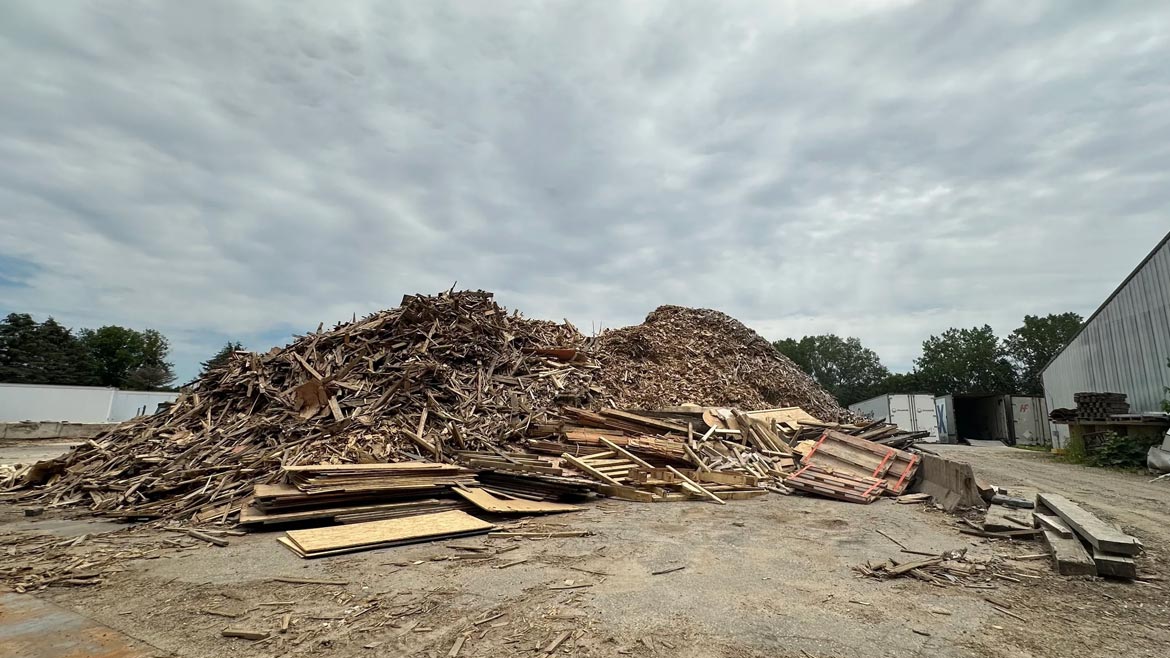Case Study
How local companies are promoting circularity through pallet reuse and recycling
Reuse and recycle.

Pallet Resource is a company that specializes in a different type of recycling: repairing and refurbishing pallets to keep them in circulation for as long as possible. Photo are courtesy of Uponor
Wooden pallets are an often overlooked — but critical part — of getting products into the hands of customers. As wood is a valuable resource with a variety of options for repurposing and recycling, it’s important to consider what happens to these materials after their use.
Dunham, Inc., a family-owned, sustainability-focused company in Lakeville, Minn., has found a positive solution to the used pallet predicament that provides a win-win-win for corporations, consumers, and the community.
Originally founded in 1984 by Dennis “Denny” Dunham as a wood shavings business, the enterprise has grown into a comprehensive recycling hub for metals, wood, and organic (food-based) products. Now run by two of Denny’s sons, Bob and Andy, the company is continuing their father’s legacy of making a positive impact on family, their community, and the environment.
When speaking to Bob, co-owner and facilities manager, his passion is evident about not just the business, but the changes he can enact to create a better, more sustainable community.
“There’s no project too big to tackle,” he says. “Every opportunity to recycle something new is a step in the right direction.” However, the recycling journey for pallets doesn’t just begin and end at two sources. These wooden forms experience several cycles of life before landing at their final destination.

Pallet Resource restores, on average, 7,000 pallets per day. Photos are courtesy of Uponor

Enter Pallet Resource, a company that specializes in a different type of recycling: repairing and refurbishing pallets to keep them in circulation for as long as possible. Once the wood is no longer usable, Pallet Resource works with partners, like Dunham, to bring these materials into their next life.
This process promotes a novel concept called circularity — reducing waste and optimizing resources by renewing and regenerating products over and over again instead of throwing them away after one or two uses.
Promoting sustainability and circularity is not only important to these reuse and recycling businesses but also to local companies using their service.
Once such company, GF Building Flow Solutions (owner of Uponor products) in Apple Valley, Minn., partners with Pallet Resource to intentionally minimize their environmental impact and, in turn, help make their products more sustainable from start to finish.
GF Building Flow Solutions manufactures Uponor PEX piping for plumbing, heating, and cooling systems in residential and commercial spaces, and the company uses thousands of pallets each year to transport their products all across North America.
“In 2023 we recycled about 478,000 pounds of pallets with Pallet Resource,” says Ryan Fleser, director of Quality and EHS at GF Building Flow Solutions. “And in the first quarter of 2024, we’ve already sent 79,000 pounds of pallets.”

In 2023, GF Piping Solutions recycled about 478,000 pounds of pallets with Pallet Resource. Photo are courtesy of Uponor
According to Fleser, these critical decisions about shipping, manufacturing, and partnerships shows the company’s true commitment to decarbonization, circularity, and sustainability. In short, it’s showing they practice what they preach.
Pallet Resource restores, on average, 7,000 pallets per day. The team analyzes the boards, replaces them with new slats, and repurposes the lumber to fit various needs. However, once the wood is no longer viable for pallet shipping, it is sent to Dunham where it is ground down, and the nails and metal pieces are removed (via magnets) to be recycled later.
What happens next is where the circularity story really comes to life. The salvaged lumber is then processed to be turned into other materials, like bedding for livestock.
“For dairy cattle, bedding can make a huge difference,” says Bob. “If they have comfortable bedding to lay on, they are happier. And happier cows produce more milk.”
So, while Dunham might be the end of the lifecycle for pallets, the interconnecting benefits of the materials continue on in other areas — the comfortable cows are producing more milk, and that milk is being turned into food for the community.
For Dunham, keeping scrap materials out of landfills is just one part of their circularity story. They are also exploring how to keep food waste out of landfills, too. Their back field is filled with compost piles, where they are exploring the best ways to turn leftover food waste — like dairy products uneaten in elementary school cafeterias — into nutrient-dense fertilizer to grow better crops and continue to feed the world.
So, it truly comes full circle. From a pallet at GF Building Flow Solutions loaded with Uponor PEX piping to bedding that provides a better quality of life for farm animals, the partnerships throughout a community can truly work collectively to build a better future for all.
Looking for a reprint of this article?
From high-res PDFs to custom plaques, order your copy today!





